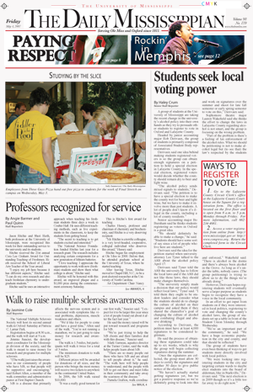
James Howard Meredith is an American civil rights activist, writer, political adviser, and United States Air Force veteran who became, in 1962, the first African-American student admitted to the racially segregated University of Mississippi after the intervention of the federal government. Inspired by President John F. Kennedy's inaugural address, Meredith decided to exercise his constitutional rights and apply to the University of Mississippi. His goal was to put pressure on the Kennedy administration to enforce civil rights for African Americans. The admission of Meredith ignited the Ole Miss riot of 1962 where Meredith's life was threatened and 31,000 American servicemen were required to quell the violence – the largest ever invocation of the Insurrection Act of 1807.

The University of Mississippi is a public research university in Oxford, Mississippi, United States, with a medical center in Jackson. It is Mississippi's oldest public university and is the state's largest by enrollment.

Oxford is the 14th most populous city in Mississippi, United States, and the county seat of Lafayette County, 75 miles (121 km) southeast of Memphis. A college town, Oxford surrounds the University of Mississippi or "Ole Miss". Founded in 1837, the city is named for Oxford, England.

William Thad Cochran was an American attorney and politician who served as a United States senator for Mississippi from 1978 to 2018. A Republican, he previously served in the U.S. House of Representatives from 1973 to 1978.

Ross Robert Barnett was an American politician and segregationist who served as the 53rd governor of Mississippi from 1960 to 1964. He was a Southern Democrat who supported racial segregation.

Paul Burney Johnson Jr. was an American attorney and Democratic politician from Mississippi, serving as 54th governor from January 1964 until January 1968. He was a son of former Mississippi Governor Paul B. Johnson Sr.

The flag of Mississippi consists of a white magnolia blossom surrounded by 21 stars and the words "In God We Trust" written below, all put over a blue Canadian pale with two vertical gold borders on a red field. The topmost star is composed of a pattern of five diamonds, an Indigenous symbol; the other 20 stars are white, as Mississippi was the 20th state to join the Union. The flag was adopted on January 11, 2021.

The Ole Miss Rebels are the 18 men's and women's intercollegiate athletic teams that are funded by and represent the University of Mississippi, located in Oxford. The first was the football team, which began play in 1893.

Mississippi Veterans Memorial Stadium is an outdoor football stadium in Jackson, Mississippi, United States. Mississippi Veterans Memorial Stadium has been the home stadium of the Jackson State Tigers football team since 1970. Originally known as War Veterans Memorial Stadium, it was later known as Hinds County War Memorial Stadium. It was redesigned and enlarged in 1960 and Ole Miss vs. Arkansas dedicated Mississippi Memorial Stadium in 1961 before a capacity crowd of 46,000. With political support from Ole Miss and Mississippi State and leadership from Ole Miss Athletics Director Warner Alford, Mississippi Memorial Stadium was enlarged to 62,500 in 1981 and on September 26, 1981 Ole Miss and Arkansas again dedicated the facility before 63,522.

The Ole Miss Rebels football program represents the University of Mississippi, also known as "Ole Miss". The Rebels compete in the Football Bowl Subdivision (FBS) of the National Collegiate Athletic Association (NCAA) as members of the Southeastern Conference (SEC). The Rebels play their home games at Vaught–Hemingway Stadium on the university's campus in Oxford, Mississippi.

The Daily Mississippian, commonly called The DM, is the student newspaper of the University of Mississippi. The first issue of The Mississippian was published in 1911. It is operated as an independent student-run newspaper, and is published in print one day a week and online daily. It publishes Thursdays during the fall and spring semesters, and occasionally during the June and July summer terms. It has a daily print circulation of 9,000 during fall and spring. It is also the only college newspaper in Mississippi to be a full member of the state press association, and it competes in the Mississippi Press Association's Better Newspaper Contest against professional daily newspapers.
The C Spire Conerly Trophy is an award given annually to the best college football player in the state of Mississippi by the Mississippi Sports Hall of Fame.
"Hail State" is the fight song and rally cry of Mississippi State University. The words and music were written by Joseph Burleson Peavey in 1939. The title of the song was adopted as the official domain name for Mississippi State athletics and for all social media platforms of the athletic department in 2014.

The Ole Miss riot of 1962, also known as the Battle of Oxford, was a race riot that occurred at the University of Mississippi—commonly called Ole Miss—in Oxford, Mississippi, as segregationist rioters sought to prevent the enrollment of African American applicant James Meredith. President John F. Kennedy eventually quelled the riot by mobilizing more than 30,000 troops, the most for a single disturbance in United States history.

Coaches and media of the Southeastern Conference (SEC) bestow the following individual awards at the end of each college football season.
Houston Davis was an American composer, arranger, teacher of music, dance band drummer, and later in his career, a justice of the peace in Hinds County, Mississippi.
The Ole Miss Rebels, the football team of the University of Mississippi, was founded in 1893. The state's first football team, the Rebels currently play in the FBS Subdivision of NCAA Division 1 Football and in the West Division of the Southeastern Conference (SEC).

Clarence Benton "Buddie" Newman was an American politician who served as Speaker of the Mississippi House of Representatives from 1976 to 1988. He was elected to one term in the state senate before beginning his 36-year career in the House, representing his native Issaquena County.
Peggie Gillom-Granderson is a chaplain at the University of Mississippi since 2009. Before starting her religious position, Gillom played on the Ole Miss Rebels women's basketball team between 1976 and 1980. During her time at Ole Miss, Gillom set career records for Mississippi with 2,486 points and 1,271 rebounds. After university, Gillom briefly played in the Women's Professional Basketball League for a year with the Dallas Diamonds. As an assistant coach, Gillom worked with Ole Miss from 1981 to 1997 before continuing her assistant coaching tenure in the Women's National Basketball Association. With the Houston Comets, Gillom and her team won the 1997 WNBA Championship.













